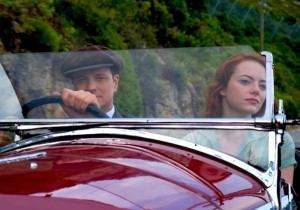MAGIC IN THE MOONLIGHT: 2 STARS. “few of the laughs we would expect.”
 “Magic in the Moonlight” feels like a Woody Allen movie. The main character, played by Colin Firth, is a misanthropic man, there’s a muse in the form of Emma Stone, there’s even a psychoanalyst and lots of talk of Freud and Nietzsche.
“Magic in the Moonlight” feels like a Woody Allen movie. The main character, played by Colin Firth, is a misanthropic man, there’s a muse in the form of Emma Stone, there’s even a psychoanalyst and lots of talk of Freud and Nietzsche.
So far, so good, but there’s also a tepid romance and one liners that have Allen’s trademark rhythm—“I always thought the unseen world was a good place for a restaurant,” says Stanley (Firth). “Spirits get hungry.”—but few of the laughs we would expect.
Set in 1928 Firth is Stanley, a world famous stage magician with “all the charm of a typhoid epidemic.” He is also a genius with a special interest in debunking fraudulent spiritualists. When his friend and fellow magician Howard (Simon McBurney) approaches him to investigate a mystic named Sophie Baker (Stone) who he thinks is bilking a wealthy ex-pat American family out of their money, Stanley gladly accepts. Travelling to the south of France the skeptical magician meets Sophie—described by her love-sick suitor Brice (Hamish Linklater) as “a visionary and a vision.”—and is soon won over by her mental abilities and physical charms. “I’ve always believed that the dull, tragic reality of life is all there is,” he says. He comes to believe Sophie is proof there is more, but will his change of heart last?
Despite tackling some of life’s big questions, “Magic in the Moonlight” feels like a trifle. At his best Allen illuminates the human condition, using equal parts humor and pathos to shine a light on how and why people do things they do.
Here he asks, “Is the rational choice always the best choice? Is a dash of rationality is what makes life interesting?” but frames those queries with a story so light and fluffy it threatens to float off the screen and into the ether with every passing scene.
Too many easy twists—He’s a skeptic. Now he’s not! Now he is again, but he’s also in love!—mar a story that is already just barely as plausible as Sophie’s psychic ability. “Here comes the usual theatrical fertilizer,” Stanley smirks during one of Sophie’s trances, but he could just as easily been talking about the movie.
Firth and Stone, with their Allenesque twenty-eight year age difference, anchor the movie easily enough; he with his stiff upper lip, she with eyes the size of saucers. The real magic, however, comes from the lush set and costume design—Stone looks like she was born to wear the floppy hats that frame her open face—and the supporting actors.
Simon McBurney is spot on as the baffled illusionist Howard and Eileen Atkins as Stanley’s Aunt Vanessa is all warmth and life, despite several overlong stagy speeches.
Thematically “Magic in the Moonlight” suggests delusions are essential to a happy life. Movies, by their nature, are delusions, but this time around director Allen may not make audiences as happy as he’s done in the past.
